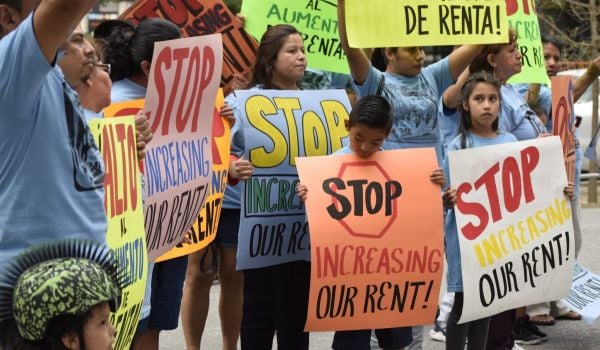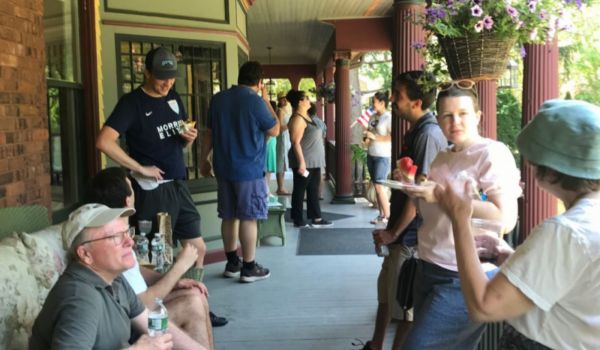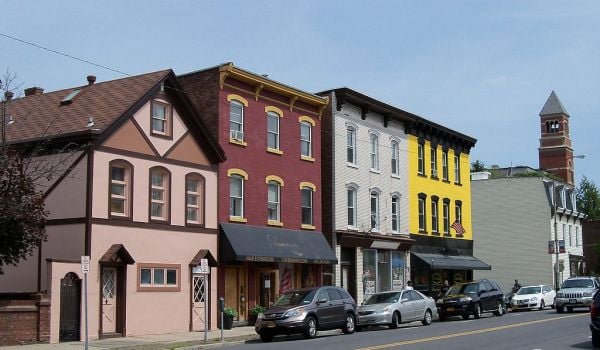Like many rent-control policies in California, Oakland’s nearly forty-year-old Rent Adjustment Program limits the amount that landlords can raise rents each year on apartments constructed before a certain date. In Oakland’s case, the cutoff year is 1983. Most apartments built prior to then are subject to the law, and under normal conditions, landlords are prevented from raising a tenant’s rent in those units by more than the cost-of-living increase in a single year. Apartments built after then are not regulated. Thousands of new apartments have been built in Oakland in recent years, but most of the city’s housing stock predates 1983, so many renters have a decent chance of finding a unit covered under rent control.
But not people with disabilities, according to a new class action lawsuit filed on behalf of three plaintiffs by two nonprofit groups in Oakland last month. Apartments that are accessible for people with disabilities only started becoming common in the late 1990s, after the passage of the Americans With Disabilities Act (ADA). But because those apartments aren’t regulated by the Rent Adjustment Program, people with disabilities are at an unfair and possibly unlawful disadvantage to other apartment hunters, the lawsuit says. In most cases, they are forced to either live in apartments that don’t meet their needs or else accept unpredictable rent increases, according to the complaint.
Ian Smith, for example, has lived in Oakland since 2012. He says he did his initial apartment hunt on Craigslist, and when he contacted landlords to ask if the apartments they were renting were wheelchair-accessible, almost all of them said “No.” Smith is a full-time wheelchair user. But the type of housing he needs doesn’t need to be purpose-built for people with disabilities. The building just has to have reasonably wide hallways and doorways, as well as light switches and fixtures that can be reached from the wheelchair. It’s housing that anyone would live in today, but there simply doesn’t seem to be any of it built before 1983.
“The reality continues to be that the only housing that’s accessible to me is the newly constructed housing,” Smith says.
Because his options are limited, Smith has been in the same apartment since he moved to Oakland. The landlord has raised the rent every year, he says, sometimes by a lot. One year it went up more than 30 percent — “That was a rather unpleasant shock,” he says. Over time, according to the complaint, Smith’s rent has increased by more than 70 percent, and he is now paying $1,200 more per month than he was paying when he moved into the apartment in 2012.
“In other words,” as the complaint says, “the lack of accessible units in the City’s Rent Adjustment Program—and Mr. Smith’s consequent inability to participate in that Program—is now costing him almost $12,000 a year.”
Smith says that as housing has become more costly throughout the Bay Area, he and other people with disabilities have talked about how it’s particularly challenging to find affordable housing in their community. He and two others plaintiffs approached Disability Rights Advocates, which Smith had worked with on previous occasions. Disability Rights Advocates partnered with the Oakland-based Public Interest Law Project to file the suit in the United States District Court for the Northern District of California.
The lawsuit seeks to have Oakland’s Rent Adjustment Program expanded or amended so that people with disabilities have a reasonable chance to find regulated apartments, says Sean Betouliere, a staff attorney at Disability Rights Advocates.
“I think this has been a known thing for a while, that if you need an accessible apartment, you can’t benefit from rent control,” Betouliere says. “For a long time I think it was just something that folks sort of accepted as the way things were. And I think that as rents have gone up and up and displacement has become a bigger and bigger issue, it has become an increasingly large problem for folks with disabilities who need accessible units, and it got to a point where folks were like, ‘Something needs to be done.’”
In California, a state law called Costa-Hawkins prevents cities from extending rent control to apartments that were exempt when the city created the policy — those built after 1983 in Oakland’s case — and to any units at all built after Feb. 1, 1995. That law would seem to limit Oakland’s ability to adjust its rent control program to apply to accessible units built in recent years. But the lawsuit says that the ADA, a federal law, preempts local and state laws, and the situation in Oakland unlawfully gives nondisabled people advantages in the housing market over people with disabilities.
“It basically means that you have this one protected class that is uniquely locked out of the benefits of this program,” Betouliere says.
The Costa-Hawkins Act has also been a target of tenants’ rights advocates for some time. Michael Rawson, director of the Public Interest Law Project, says his group has advocated for Costa-Hawkins to be repealed as well. But it only occurred to both him and Betouliere that they could argue that the ADA preempts the act after spending time talking about the issue with the plaintiffs.
A spokesman for Oakland Mayor Libby Schaaf did not respond to a request for comment or an interview.
Betouliere says the lawyers are open to adding more plaintiffs to the case, but don’t believe they need to. Oakland has to respond to the lawsuit by the end of October, he says. If it finds a way to change the program so that people with disabilities can benefit from rent control, the lawsuit could be moot, he says.
“There are a number of possible options available, and that’s going to be a process of working with the city and with the court to figure out what is the ideal outcome,” Betouliere says. “But the fundamental goal is that folks with disabilities are no longer left out, and that they have a real opportunity to enjoy the same protections that are available to everybody else.”
This article is part of Backyard, a newsletter exploring scalable solutions to make housing fairer, more affordable and more environmentally sustainable. Subscribe to our weekly Backyard newsletter.

Jared Brey is Next City's housing correspondent, based in Philadelphia. He is a former staff writer at Philadelphia magazine and PlanPhilly, and his work has appeared in Columbia Journalism Review, Landscape Architecture Magazine, U.S. News & World Report, Philadelphia Weekly, and other publications.
Follow Jared .(JavaScript must be enabled to view this email address)


















